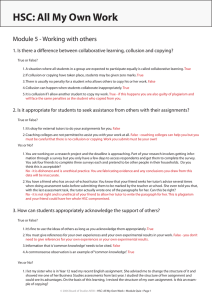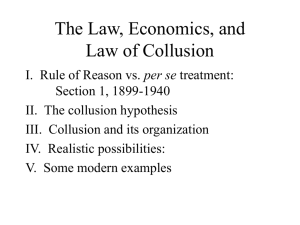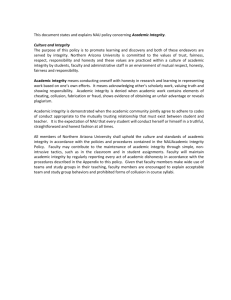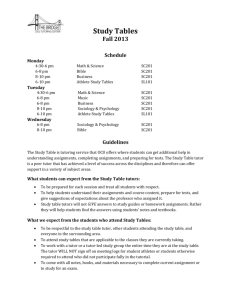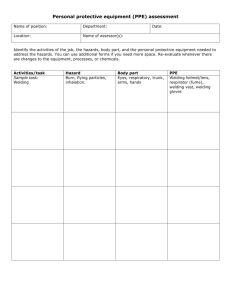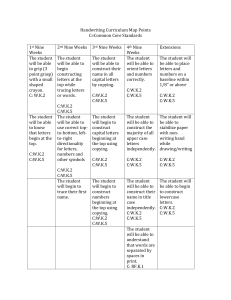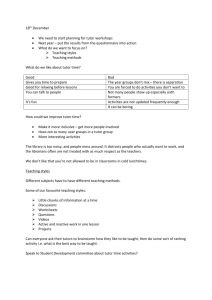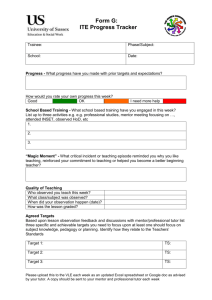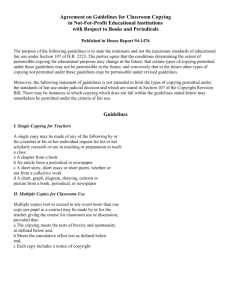ALL MY OWN WORK - working with others worksheet
advertisement
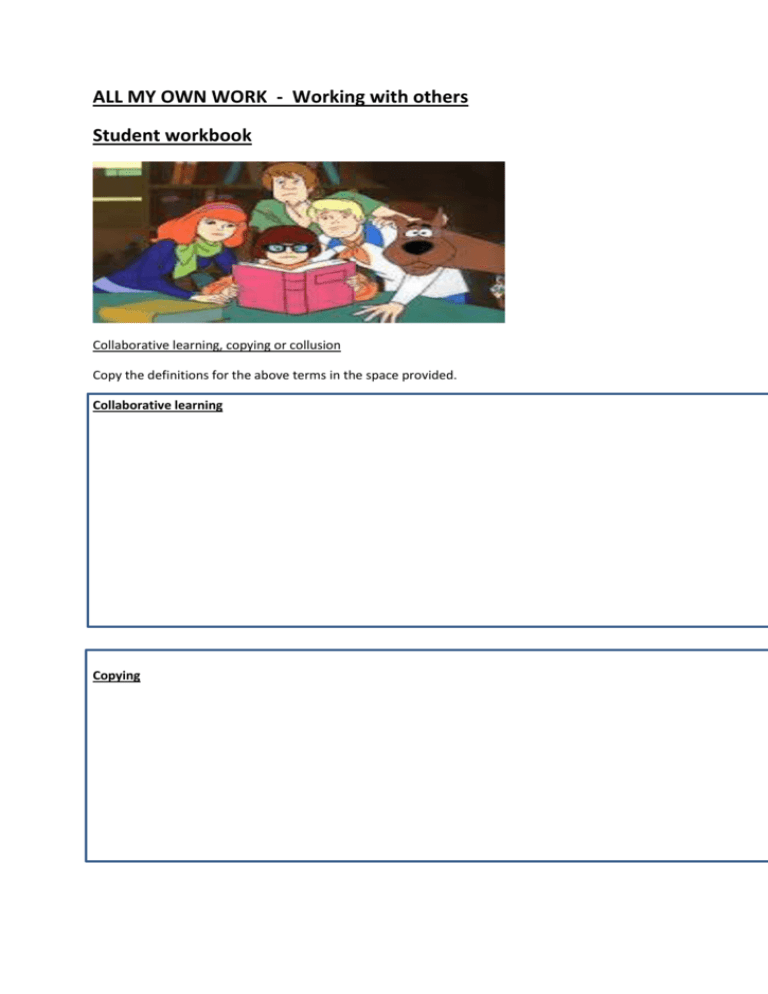
ALL MY OWN WORK - Working with others Student workbook Collaborative learning, copying or collusion Copy the definitions for the above terms in the space provided. Collaborative learning Copying Collusion Consider the following situations. Are they examples of collaborative learning, copying or collusion? Write your answers in the space provided. 1. Mary has access to a tutor who regularly rewrites whole paragraphs of Mary’s assignments, or tells Mary what to write. 2. Riva logs on to a blog and finds some information which is relevant to her current assessment task. She exchanges information via the blog and tests some of her ideas out through an online discussion board. 3. In Sam’s class there is a small group discussion on a particular issue. The discussion is to assist students in the preparation of their reports. Sam takes detailed notes of others’ contributions, especially Ahmed’s. He copies all of Ahmed’s notes because Ahmed knows this topic really well. Sam uses the notes word for word in his report and submits it without any acknowledgement of Ahmed’s notes. Consider these situations 1. Your brother did the same course as you two years ago and offers to help you with an essay. In fact, he remembers working on a similar assessment task himself and finds it for you. You decide to copy parts of his essay in your own assessment task. Q. Is this appropriate? State the reason for your answer. 2. You have spent a lot of time working on a digital media assignment for Visual Arts and have run out of time. Your girlfriend has had to do a similar project for Drama and you decide to use her work and submit it as your assignment. Her teacher is better than yours and has given her more help. Noone will ever know. Q. Is this appropriate? State the reason for your answer. 3. Your Dad is a professional plumber and is great at welding. In your Visual Arts Body of Work, you are making a sculpture that requires welding. Your Dad demonstrates welding and supervises your welding. You record this in your Visual Arts Process Diary. Q. Is this appropriate? State the reason for your answer. Working with others Quiz Q. Is there a difference between collaborative learning, collusion and copying? True or False? 1. A situation where all students in a group are expected to participate equally is called collaborative learning. 2. If collusion or copying has taken place, students may be given zero marks. 3. There is usually no penalty for a student who allows others to copy his or her work. 4. Collusion can happen when students collaborate inappropriately. 5. It is collusion if I allow another student to copy my work. True or False? Q. Is it appropriate for students to seek assistance from others with their assignments? 1. It’s okay for external tutors to do your assignments for you. 2. Coaching colleges are not permitted to assist you with your work at all. Yes or No? 1. You are working on a research project and the deadline is approaching. Part of your research involves getting information through a survey but you only have a few days to access respondents and get them to complete the survey. You ask four friends to complete three surveys each and pretend to be other people in their households. Do you think this is acceptable? 2. You have a friend who has an out-of-school tutor. You know that your friend seeks her tutor’s advice several times when doing assessment tasks before submitting them to be marked by the teacher at school. She even told you that, with the last assessment task, the tutor actually wrote one of the paragraphs for her. Can this be right? True or False? Q. How can students appropriately acknowledge the support of others? 1. It’s fine to use the ideas of others as long as you acknowledge them appropriately. 2. You must give references for your own experiences and your own experimental results in your work. 3. Information that is ‘common knowledge’ needs to be cited. 4. A common sense observation is an example of “common knowledge”. Yes or No? Q. I let my sister who is in Year 12 read my recent English assignment. She advised me to change the structure of it and showed me one of her Business Studies assessments from last year. I studied the structure of her assignment and could see its advantages. On the basis of this learning, I revised the structure of my own assignment. Is this an example of copying? True or False? Q. What are the benefits of producing your own work? Correct citation will help to avoid any accusation of plagiarism. Students develop new skills through producing their own work. It is impossible to know how well you understand a subject if you plagiarise. It is not possible to give credit for an individual’s contribution to a group project. Q. What strategies can be used to ensure appropriate collaboration in a group work context? Use the following words to fill in the blanks below: Unequal, citation, responsibility, understanding, journal Group work contexts require a clear __________ by students of what the ground rules are. Careful division of __________ is necessary in group work situations. Your teacher can help if there are problems with __________ contributions in completing a group task. Keeping a personal __________ can help each group member to identify the contribution each person has made. Checking the final draft is important for each group member. This helps to ensure that there is consistency in _______ formatting.
